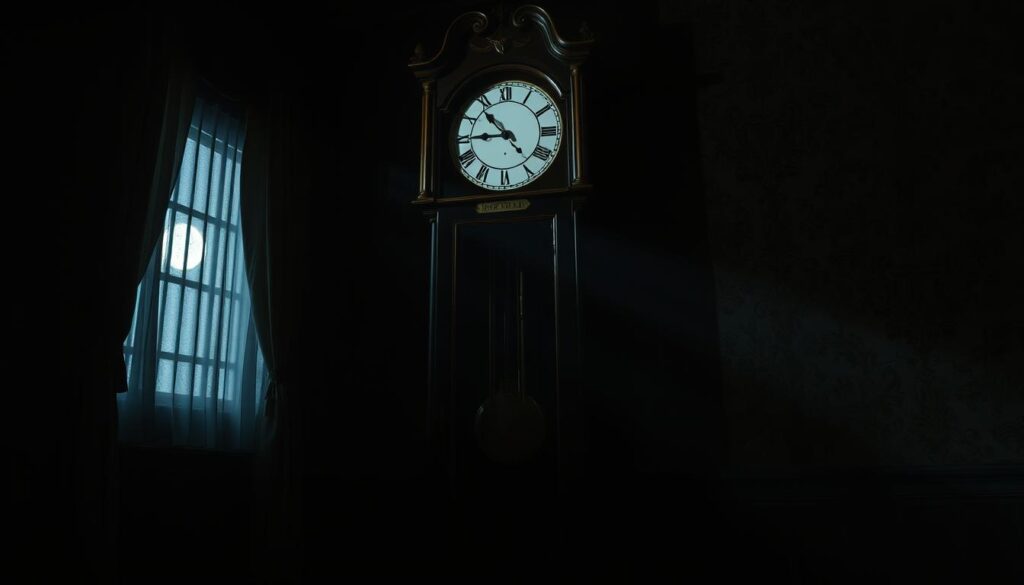Clock Stops Exactly When Its Owner Dies – The story of a clock stopping when its owner dies is both intriguing and mysterious. It has happened many times in history. This event has made people curious and sparked debates about what it means.

This article will look into the history of this phenomenon. We will explore famous cases and the scientific and cultural views on it. By diving into this mystery, we aim to understand why clocks might stop at such a moment.
Key Takeaways Clock Stops Exactly When Its Owner Dies
- The uncanny phenomenon of a clock stopping exactly when its owner dies has been reported throughout history
- This event raises questions about the nature of time and our connection to it
- There are various scientific explanations and cultural beliefs surrounding this phenomenon
- Famous cases of clock stoppage will be explored in this article
- The phenomenon of a clock stopping exactly when its owner dies is a complex and multifaceted topic
- By examining this phenomenon, we can gain a deeper understanding of the mystery behind clock stoppage
When Time Stands Still: Understanding the Clock-Stopping Phenomenon
The clock-stopping phenomenon has long fascinated people. Many historical accounts and documented cases have sparked curiosity. It’s important to look at the timepiece mechanisms and patterns in these reports to understand it better.
Exploring historical accounts of clock stoppage reveals various factors. Timepiece mechanisms are key to understanding clock function and potential stoppage. Each type of clock, from mechanical to electronic, has its own characteristics and weaknesses, Clock Stops Exactly When Its Owner Dies.
- Age and condition of the clock
- Type of timepiece mechanism used
- Environmental factors, such as temperature and humidity
- Human interaction with the clock
By analyzing these factors and historical accounts, we can spot patterns. This helps us understand the possible causes of this phenomenon.
The study of timepiece mechanisms and historical accounts can provide valuable clues about the clock-stopping phenomenon. It may help us understand the underlying mechanisms that drive this enigmatic event.
Famous Cases Where Clock Stops Exactly When Its Owner Dies
Many famous cases show clocks stopping when their owners die. This has sparked a lot of interest and talk about a supernatural connection between time and death. For example, King Charles I of England’s clock stopped at his execution in 1649.
Another famous case is Abraham Lincoln’s clock. It stopped at 7:22 am on April 15, 1865, the day he was assassinated. These stories make people think there’s a special link between clocks and their owners’ lives.
- The clock of Queen Victoria, which stopped at the moment of her death in 1901
- The clock of Winston Churchill, which stopped at the exact time of his death in 1965
- The clock of Albert Einstein, which stopped at the moment of his death in 1955
These famous cases have made people even more curious about the supernatural connection between time and death. They leave us wondering if there’s more to it than just chance, Clock Stops Exactly When Its Owner Dies.
The Science Behind Timepiece Mechanisms
To grasp the details of clock stoppage, we must explore the science behind timepieces. Mechanical clocks have been key in keeping time for centuries. Their complex parts, like gears, springs, and balance wheels, work together to measure time accurately, Clock Stops Exactly When Its Owner Dies.
At the core of mechanical clocks is a system of gears. These gears pass power from the mainspring to the balance wheel. This wheel swings back and forth, dividing time into equal parts. The mechanical clocks of old were engineering wonders, with some still working today after centuries.
Some common reasons for clock stoppage include:
- Worn or damaged gears
- Weak or broken mainsprings
- Dirty or corroded mechanisms
By looking into the scientific explanations of clock mechanisms, we learn more about clock stoppage. Whether it’s a mechanical or electronic clock, the basics of timekeeping are the same. As we delve deeper into clock stoppage, we might find new insights into the relationship between time, mechanics, and us.
| Type of Clock | Mechanism | Possible Causes of Stoppage |
|---|---|---|
| Mechanical | Gears, springs, balance wheel | Worn gears, weak mainsprings, dirty mechanisms |
| Electronic | Quartz crystal, battery, circuitry | Dead battery, faulty circuitry, damaged quartz crystal |
Cultural Beliefs About Time and Death
Across different cultures, cultural beliefs about time and death vary a lot. These beliefs shape how societies see the link between time and death. This, in turn, can change how we view the idea of time stopping, Clock Stops Exactly When Its Owner Dies.
In many cultures, time is seen as a straight line with a start, middle, and end. Death is seen as a move to another life or spiritual place.
Some cultures think time is a circle, with events repeating forever. This view can help people deal with death, seeing it as part of life’s cycle. For example, in some indigenous cultures, death is not the end but a change, where the spirit goes on in another form.
In many societies, time and death are closely linked. Knowing we will die can make people live more mindfully. Cultural beliefs about time and death also shape how we mourn and honor our ancestors. By looking at these beliefs, we can understand more about human life and the complex bond between time and death, Clock Stops Exactly When Its Owner Dies.
Common themes include using clocks to mark life’s big moments, like births and funerals. Many cultures also have traditions like ancestor worship, honoring the dead and their ongoing presence in our lives. These traditions show how deeply cultural beliefs influence our views on time and death, Clock Stops Exactly When Its Owner Dies.
Investigating the Supernatural Connection
Clocks stopping at the exact moment of their owner’s death fascinates many. It has led to a deep interest in the supernatural link between time and death. Many think paranormal theories explain this, suggesting the spirit or energy of the deceased can impact the physical world, Clock Stops Exactly When Its Owner Dies.
One theory is energy transfer. It says the energy of the deceased can move to the clock, making it stop. This idea is backed by some paranormal theories. They believe the energy of the deceased can linger and influence the physical world, Clock Stops Exactly When Its Owner Dies.
Exploring Psychic Medium Perspectives
Some psychic mediums see clocks stopping as a sign from the deceased. They think it’s a way for the spirit to communicate with the living. According to them, the energy transfer from the deceased to the clock is a message or comfort for those left behind.
- Paranormal theories suggest that the spirit or energy of the deceased can affect the physical world.
- Energy transfer proposes that the energy of the deceased can be transferred to the clock, causing it to stop.
- Psychic medium perspectives offer a unique insight into the phenomenon, suggesting that it may be a sign of the deceased’s spirit trying to communicate with the living.
Scientific Explanations and Skeptical Views
Looking into clocks stopping at their owner’s death time, we must think about scientific explanations and skeptical views. Experts say it could be due to mechanical failure, power outages, or just chance, Clock Stops Exactly When Its Owner Dies.
Some scientific explanations for this include:
- Mechanical failure due to wear and tear
- Power outages or electrical surges
- Environmental factors, such as extreme temperatures or humidity
Also, skeptical views point out that it might be due to confirmation bias or selective reporting. By looking at these scientific explanations and skeptical views, we can better understand the clock-stopping phenomenon.

Personal Stories from Families Who Experienced This Phenomenon
Many families have shared their stories about the clock-stopping phenomenon. These stories give us a peek into the emotional and psychological effects it has. By looking at these personal accounts, we can understand the phenomenon better.
These stories often talk about shock, disbelief, and fascination. Families who have seen this phenomenon feel amazed and wonder-struck. Witness testimonials also show the emotional impact, with feelings of sadness and loss, Clock Stops Exactly When Its Owner Dies.
Today, you can find these stories in books, articles, and online forums. These accounts share personal stories and witness testimonials. They help us understand the phenomenon’s effects on people and families.
- Accounts from families who have experienced the clock-stopping phenomenon across multiple generations
- Stories from individuals who have witnessed the phenomenon in different contexts, such as in their homes or in public places
- Testimonials from experts who have studied the phenomenon and its effects on individuals and families
The Role of Coincidence vs. Causation
Looking into the clock-stopping phenomenon, we must think about coincidence versus causation. We need to dive into statistical analysis to see if a clock really stops at the exact moment of death. This helps us understand the possible reasons behind this phenomenon.
Understanding probability factors is crucial. We look at the number of clocks, their average life span, and yearly deaths. This helps us figure out if it’s just a coincidence or if there’s something more to it.
Some important things to consider are:
- The average number of clocks in use per household
- The average lifespan of a clock
- The number of deaths that occur each year
- The likelihood of a clock stopping at a given moment

By looking at these factors and doing a detailed statistical analysis, we can better understand the clock-stopping phenomenon. This helps us see if it’s just a coincidence or if there’s a deeper reason. It also helps us find any patterns or trends that might be linked to this phenomenon, shedding light on the mysterious connection between time and death.
| Factor | Description |
|---|---|
| Average number of clocks per household | 2-3 clocks per household |
| Average lifespan of a clock | 10-20 years |
| Number of deaths per year | approximately 7.9 million in the United States |
Conclusion: Clock Stops Exactly When Its Owner Dies
As we wrap up this fascinating journey, it’s clear that the clock-stopping phenomenon is a big mystery. It has puzzled us for ages, making us question how time, death, and life are connected.
Science has given us some clues, but the real truth is still a secret. It could be chance, energy, or something deeper. This mystery shows us how much we still don’t know about time and life – Clock Stops Exactly When Its Owner Dies.
This mystery leaves us in awe and humility. It reminds us that there’s still so much we don’t understand. It encourages us to keep exploring and learning about the world’s secrets.
FAQ
What is the clock-stopping phenomenon?
The clock-stopping phenomenon is a mysterious event where a clock stops at the exact moment of its owner’s death. It has been reported throughout history. This has sparked interest and speculation about a possible supernatural link between time and death.
What are some famous cases of the clock-stopping phenomenon?
Famous cases include Queen Marie Antoinette, Charles Dickens, and Ralph Waldo Emerson. These stories have captured the public’s imagination. They have led to ongoing investigations into the phenomenon’s causes.
How do mechanical and electronic clocks function, and what can cause them to stop?
Mechanical clocks use gears and springs, while electronic ones use quartz crystals or atomic oscillations. They can stop due to power outages, mechanical failures, or environmental changes. Understanding how they work can help explain the clock-stopping phenomenon.
What are some of the cultural beliefs and supernatural theories surrounding the clock-stopping phenomenon?
Various cultures have their own views on time and death. Some believe the clock’s stoppage signals the soul’s departure or a premonition. Paranormal theories suggest energy transfer or psychic mediums might be involved. Exploring these beliefs can deepen our understanding of the phenomenon.
How can we determine if the clock-stopping phenomenon is a coincidence or a causal relationship?
Statistical analysis and probability are key to understanding this phenomenon. By looking at the chances of a clock stopping at the exact moment of death, researchers can figure out if it’s a coincidence or a real connection.
Source
https://fosterhillroadcemetery.co.uk/stopping-all-the-clocks/
https://masterrehab.wordpress.com/2013/09/15/clocks-that-stop-when-disaster-and-death-strike/
